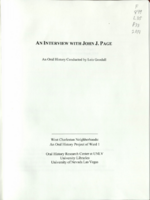Search the Special Collections and Archives Portal
Search Results
Donald G. Anderson oral history interview
Identifier
Abstract
Oral history interview with Donald G. Anderson conducted by Jacqueline Buettner on May 01, 2005 for the Public School Principalship Oral History Project. In this interview, Anderson reflects upon his 30-year career as an elementary school teacher and administrator with the Clark County School District from the 1970s to the 2000s. He discusses his upbringing, and how his own pursuit of education led to his becoming a teacher and administrator. He describes his philosophy of education, and discusses how it evolved with different experiences.
Archival Collection
Micheal Reese oral history interview
Identifier
Abstract
Oral history interview with Micheal Reese conducted by Helen Nader on February 27, 1979 for the Ralph Roske Oral History Project on Early Las Vegas. In this interview, Reese discusses his career as a teacher and how the school system has changed in Las Vegas, Nevada over time.
Archival Collection
Clifford J. Lawrence oral history interview
Identifier
Abstract
Oral history interview with Clifford J. Lawrence conducted by Stephany Herrera on April 02, 2001 for the Public School Principalship Oral History Project. In this interview, Lawrence reflects upon his career as a teacher and administrator with Nevada’s Clark County School District (CCSD) from the 1950s to the 1980s. He describes how he first started teaching at the Las Vegas Union School District, before it was named the Clark County School District. He discusses his experiences with school bussing and integration, his approach to school administration, and how his experiences as a teacher shaped his approach to administration. He discusses the importance of principals' community involvement, and their working relationship with assistant principals and the Board of Education.
Archival Collection

Transcript of interview with John Page by Lois Goodall, April 16, 2014
Date
Archival Collection
Description
John J. Page attended 13 schools before graduating from high school in the Ozark Hill Country of Oklahoma. Although he engaged in no combat, he was drafted into military after completing two years of college at the University of Oklahoma in Norman, Oklahoma. After his discharge from the U.S. Air Force, he helped his wife, Reitha, finish the credits she needed to complete her degree, and he then worked to complete his in Norman. Following his graduation, the couple relocated to Las Vegas in February 1959, when Reitha found a job at Washington Elementary School. In Las Vegas John completed his practice teaching under master teacher Lamar Terry at Twin Lakes Elementary School and under supervision of Dr. Holbert Hendrix at the University of Nevada, Las Vegas. John held his first teaching assignment, fifth grade at West Charleston Elementary School (later called Howard Wasden Elementary School), for 27 years before transferring with his principal to Helen Marie Smith Elementary School. For a time John and Reitha rented a small house at the comer of Bonanza Road and First Street that was owned by entertainer Horace Heidt. They bought their first house, a Pardee Park Home one block north of Tom Williams Elementary School in North Las Vegas, because Reitha taught there, and she and the children could walk to school together. In 1973 they bought their current house on El Cortez Avenue in the Westleigh tract. Page not only worked in Ward 1 for 27 years of his 36-year teaching career (1959-1995); he and his family also lived in Ward 1 for more than forty years. As a teacher in the school that served the wealthiest Las Vegas families, Page witnessed the many ways that generous donations of time, money, and talent matter to schools, students, and teachers. As an early resident of Westleigh tract, Page saw dramatic changes to the area's built environment. And as a longtime educator, Page observed several cycles of experimental instmctional techniques and philosophies.
Text

Patricia Vazquez interview, November 14, 2018, June 14, 2019: transcript
Date
Archival Collection
Description
Session 1: Interviewed by Marcela Rodriguez-Campo. Barbara Tabach also participates in the questioning. Session 2: Interviewed by Rodrigo Vazquez. Monserrath Hernandez also participates in the questioning. Patricia Vazquez was born and raised in Las Vegas, NV and shares her experiences growing up in the Valley as a Queer Latina. At a young age, she remembers traveling back and forth between Mexico and the U.S. to visit family. When she started school she shares how her home language, Spanish, became her family's "secret language" as she began to learn English. During elementary school Patricia was tracked into the special education program, and remove from the mainstream classroom. She would find her love for learning in books and libraries as she taught herself how to read in English. Despite being tracked into less advanced courses, Patricia would end up taking AP/ Honors courses in high school after forging her favorite teachers signature, which changed her educational trajectory. After coming out to her family, Patricia went nearly a decade distanced from her mother and continued her college education at Arizona State University. There, she would complete a bachelors in painting and a masters in comparative literature. Her work with the Chicano Studies program at ASU helped her develop her Chicana identity and begin her involvement in social activism. In Las Vegas, she worked to fight for marriage equality and LGBTQ rights with the American Civil Liberties Union , and later with the Progressive Leadership Alliance of Nevada. She also conducted several lectures for the Latino Youth Leadership Conference on sexuality, gender, and homophobia for over a decade. She has served as an English Professor at the College of Southern Nevada for the last 20 years and is an avid hiker, traveler, and painter.
Text

Photograph of Adalberto Meneses and woman, University of Nevada, Las Vegas, circa 1970s
Date
Archival Collection
Description
Teacher Adalberto Meneses instructing a class at the University of Nevada, Las Vegas.
Image
Monte Bay oral history interview
Identifier
Abstract
Oral history interview with Richard "Monte" Bay conducted by Peter Brown on November 14, 2006 for the Public School Principalship Oral History Project. In this interview, Bay reflects upon his career as a teacher and administrator with the Clark County School District (CCSD) from the 1980s to the time of the interview. Originally from Nevada, he describes his upbringing and pursuit of education, how he became a teacher, and eventually a principal. He discusses his regular job responsibilities and challenges that he faced with school overcrowding. He also describes his approach to leadership, and how his approach changed working at high schools such as Coronado High School.
Archival Collection
Gary Delvin oral history interview
Identifier
Abstract
Oral history interview with Gary Delvin conducted by Roberta Threatt on April 08, 2003 for the Public School Principalship Oral History Project. In this interview, Delvin reflects upon his nearly 30-year career as an elementary school teacher and administrator in Oregon from the 1970s to the early 2000s. He discusses his upbringing and path to becoming a teacher, his philosophy of education, and training that he feels was most helpful throughout his career.
Archival Collection

Transcript of interview with Harvey N. Dondero by Iskander A. Batlouni, February 26, 1981
Date
Archival Collection
Description
Text
Legislative subject files (S): school budgets, sex offenders, sine die information, teen smoking, special education, special session, sports commission, state parks, Super Collider, surveillance bill, encouraging "Star Wars program"-Strategic Defense Initiative, 1983 to 2005
Level of Description
Archival Collection
Collection Name: Bob Coffin Political Papers
Box/Folder: Box 121
Archival Component
